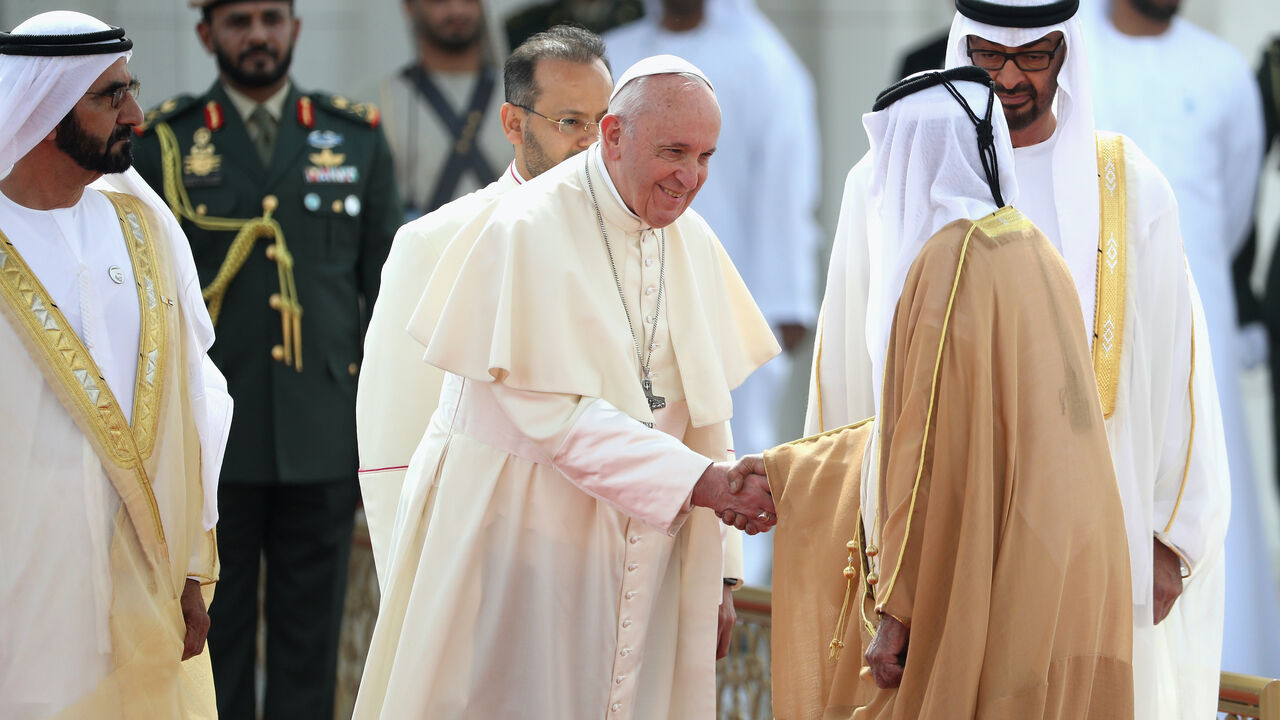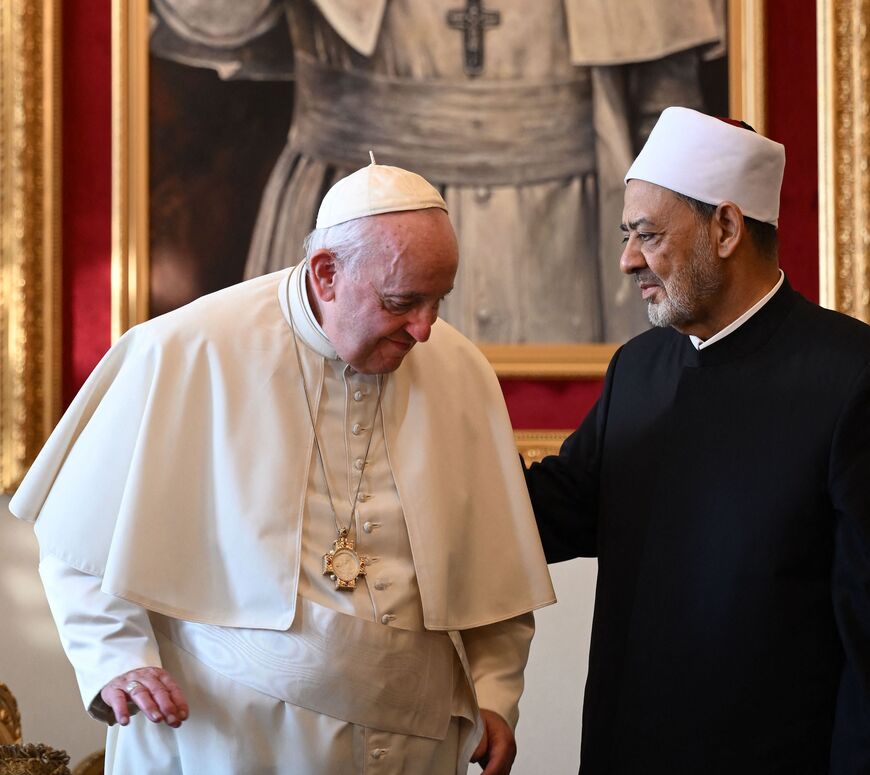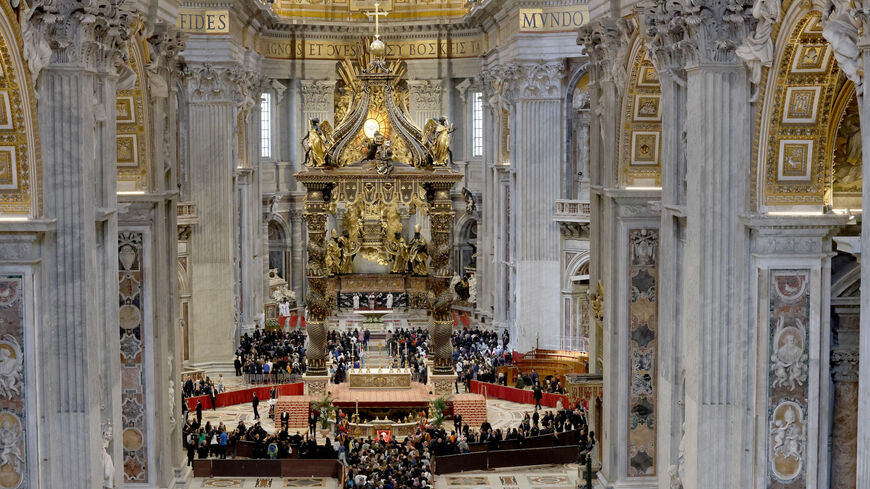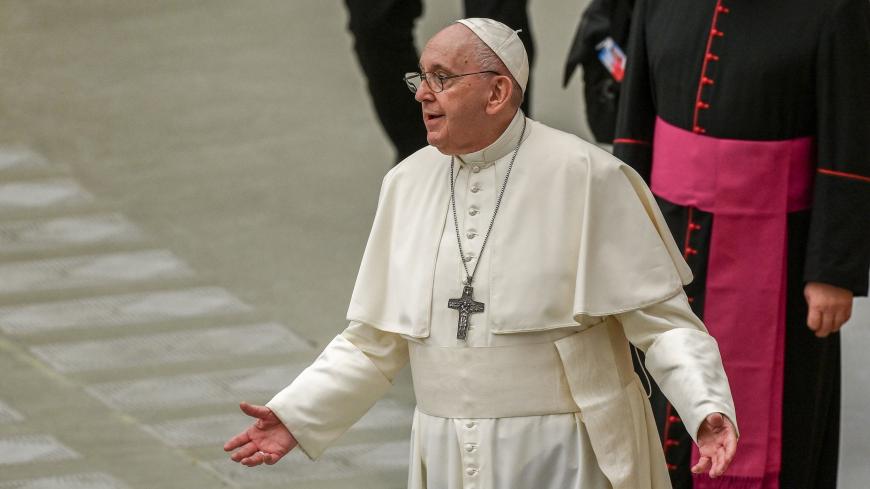Middle East churches, Al-Azhar, leaders mourn Pope Francis
Pope Francis was praised by several regional leaders and churches, including Lebanon's Maronite Church and Iraqi officials, who noted his historic visit to Iraq in 2021.

Church leaders, regional officials and Egypt’s Al-Azhar — Sunni Islam’s foremost religious institution — offered condolences this week following the death of Pope Francis, whose passing on Monday at the age of 88 drew tributes across the Middle East.
Francis passed away following struggles with a respiratory illness, having been hospitalized for more than a month starting in mid-February. His last public appearance was on Sunday, when he greeted the crowd outside the Vatican for Easter Sunday. He met US Vice President JD Vance earlier that day.
Regional churches mourn
The Chaldean Patriarchate of Baghdad mourned Francis in a statement, recalling his historic 2021 visit to Iraq.
“We in Iraq will never forget his visit,” said the patriarchate. “He left our world on Easter, and we are certain that he is in the kingdom.”
The Chaldean Church is based in Iraq and in communion with the Vatican. It is one of several churches representing Aramaic-speaking Christians in Iraq and is headed by Patriarch Louis Sako. Francis made Sako a cardinal in 2018.
In 2021, Francis traveled to Baghdad, the Kurdistan Region capital of Erbil, the predominantly Assyrian Christian town of Qaraqosh and other areas. He was the first pope to visit the country and was applauded by the local Christian community for the trip.
Iraq’s Chaldean, Assyrian and Syriac Christians form one of the oldest Christian communities in the world. They numbered 1.5 million before the 2003 US-led invasion, but the population has dwindled to around 150,000. The community was among those targeted by the Islamic State in 2014.
The Archbishop of the predominantly Chaldean town of Ankawa, Bashar Warda, said in an Instagram post that “Erbil still remembers you with gratitude, Pope Francis.”
The Maronite Foundation, a nonprofit established by Lebanon’s Maronite Church, called Francis a “voice of peace in our world” in a statement.
"With deep gratitude, we remember his enduring love for Lebanon and his constant prayers for its people,” said the foundation.
The Maronite Church is likewise in communion with the Vatican and is led by Patriarch Beshara Rai. He was made a cardinal in 2012 by Francis’ predecessor, Pope Benedict.
Francis last met with Rai in October of last year at the Vatican. Francis repeatedly expressed a desire to visit Lebanon but never made it to the country. He had pledged to visit once “conditions” were met, according to reports. His predecessors Benedict and John Paul visited in 2012 and 1997, respectively.
Francis addressed the conflict in the Middle East toward the end of his life. He told reporters in September that “defense must always be proportionate to the attack” when asked about Israel’s military actions in Gaza and Lebanon after the strike that killed Hezbollah leader Hassan Nasrallah in Beirut that month. The pope did not mention Israel by name in his remarks but said that he speaks to the parish in Gaza daily.
The Egypt-based Coptic Orthodox Church called Francis a "beloved servant and dear brother for his sincere love and true example of Christian humility, which he demonstrated throughout his fruitful journey of service," in a statement.
Francis visited Egypt in 2017 and met the head of the Coptic church, Pope Tawadros, during the trip.
Middle East reactions
Lebanese President Joseph Aoun, who is himself Maronite, praised Francis for his support of Lebanon in a statement.
“The late Pope always carried Lebanon in his heart and prayers and constantly called on the world to support Lebanon in its times of hardship,” said Aoun. “We will never forget his repeated appeals to protect Lebanon and preserve its identity and diversity.”
Prime Minister Nawaf Salam declared three days of mourning in Lebanon to mark Francis’ death.
Jordan’s King Abdullah II said “Pope Francis was admired by all as the Pope of the People” in a post on X.
Israeli President Isaac Herzog said on the social media platform that the pope “rightly saw great importance in fostering strong ties with the Jewish world and in advancing interfaith dialogue,” and he thanked him for praying for the return of the Israeli hostages captured by Hamas and regional peace.
Turkish President Recep Tayyip Erdogan said on X that Francis “gave importance to dialogue between different faith groups and took the initiative in the face of humanitarian tragedies, especially the Palestinian issue and the genocide in Gaza.”
Palestinian President Mahmoud Abbas called Francis “a symbol of tolerance, love and fraternity,” the Palestinian Authority’s WAFA news agency reported.
Egyptian President Abdel Fattah al-Sisi in a statement referred to the pope as an “exceptional global figure who dedicated his life to the service of peace and justice."
Sheikh Ahmed El-Tayyeb, the Grand Imam of Egypt’s Al-Azhar — Sunni Islam’s most prestigious seat of learning — called Francis a “true friend to Muslims, sincere in his pursuit of peace,” and praised “his final statements, particularly in defense of Palestine and the oppressed people of Gaza."
The president of Iraq’s Kurdistan Region, Nechirvan Barzani, said that Francis will be “remembered with deep respect and gratitude by all our people” for his visit.
Hamas praised Francis’ “moral and humanitarian stances,” the Hamas-affiliated Palestinian Information Center reported, while Hezbollah commended his “constant support” for Lebanon via its news agency Al-Manar.
Iranian President Massoud Pezeshkian offered his condolences in a statement, saying Francis promoted "peace and unity across nations and faiths," the official Islamic Republic News Agency reported.
What’s next? A new pope will be selected by a process known as conclave, whereby eligible cardinals seclude themselves in the Vatican until a candidate is chosen. Technically, any Catholic male can be elected pope, though a cardinal is traditionally selected. Only cardinals under the age of 80 are eligible to vote. The papal conclave concludes when a candidate secures a two-thirds majority of the votes cast by the cardinal electors, and typically takes several days.
There are a number of cardinals in the Middle East and North Africa, some of whom are eligible to vote for the next pope. Sako, 76, will be eligible to vote, as will Dominique Mathieu, the 76-year-old Belgian Archbishop of Tehran in Iraq, and Pierbattista Pizzaballa, the 60-year-old Italian who leads the Latin Patriarchate of Jerusalem.
Sudan’s Cardinal Gabriel Zubeir Wako is 84, while Rai is 85.
One candidate who is reportedly in the running to succeed Francis is Archbishop of Marseille Jean-Marc Aveline, a Frenchman who was born in Algeria when it was a territory of France.






